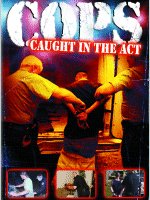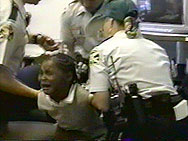Institutionalized sadism
(Via Atomic Nerds 2009-02-08, flip flopping joy 2009-03-03, and NPR.)
See if you can figure out what all of these cases have in common.
Trigger warning. The stories below involve verbal descriptions, and a news video below includes repeated displays of silent but very graphic footage, of extreme physical violence by adult teachers and male police officers against young men, young women, and girls under their authority.
In Idaho, an eight-year-old girl who has been labeled with Asperger’s Syndrome was taken out of a class Christmas party at her government-run school, because she was wearing a hoodie with cow ears and a tail, which she refused to take off on the arbitrary orders of her teacher. For this minor dress code violation, she was stuck in a separate room and intervened
with by a pair of teachers. While she was under their power, she peacefully tried to walk out of the room through an open door, so the adult teachers physically grabbed her and forced her down into four point restraint; when she screamed and tried to get out of the painful hold they had put her in, the teachers then called in the county government’s police, who came in, grabbed this 54-pound girl, handcuffed her, marched her out to a police car, and took her to a juvie prison, for battering
the teachers who were physically restraining her when all she wanted was to be left the hell alone. This sustained assault by several different adults, some of them heavily armed, on an upset child, which has left her with bruises, is dignified as a scuffle
by the newspapers:
The mother of an 8-year-old autistic girl who was arrested after a scuffle with her teachers said it was horrifying to watch her daughter be led away in handcuffs from her northern Idaho elementary school.
Police in Bonner County, Idaho, charged the girl, Evelyn Towry, with battery after the arrest Friday at Kootenai Elementary School.
Even though prosecutors dismissed the case Tuesday, the family is considering legal action against the school. They say their daughter was physically restrained to the point of causing bruises and is now tormented by memories of the incident.
… Towry said Evelyn, who loves Spongebob Squarepants, told her she was put in a separate classroom away from the party, but when she tried to leave, the teachers told her to stay put. Evelyn did not listen, Towry said, and the adults physically restrained her.
She reacted in a violent way to the physical restraint,Towry said.Towry said her daughter demonstrated for her how she was held down by her arms and legs. And Towry videotaped the thumb-sized bruises she says were left on Evelyn’s legs from the incident.
She saidTowry said.I was very scared,She told me she was being hurt.Dick Cvitanich, superintendent of the Lake Pend Oreille School District, which includes the school where Evelyn was a student, said the school called police because
there was escalating behavior that resulted in what we perceived to be an assault on staff.
No doubt; but who, in this situation, was doing the escalating
?
…
Teachers and the principal wished to pursue charges because they felt there were ongoing problems and this was the only way to resolve it,Lakewold said.But Towry said her daughter thinks she got into so much trouble simply because she didn’t want to take off her cow costume.
When asked what she likes best about school, Evelyn responded quickly and emphatically.
Nothing,she said.I don’t like school.
Meanwhile, in Occupied Seattle, a 15 year old black girl was taken to a government jail by the county government’s cops after she and a friend went on a joyride in her friend’s mother’s car. While under their power, according to the cops, she got quote-unquote real lippy
over how they were treating her, and went so far as to call them some unkind names. Then, when she was being locked in a cell, the cops ordered her to take off her shoes; she kicked off one of the shoes towards the heaily armed cop who was about to lock her securely in a room she couldn’t escape from. Instead, he decided to take this escalating behavior
as assaulting a police officer,
which is of course a perfect opportunity for intervention
— in this case, rushing the 15 year old girl, kicking her in the gut, slamming her against the wall of her cell, pulling her back by her hair, slamming her to the ground, pinning her down, and smashing her repeatedly with his fist while she was physically restrained by himself and his gang brother.
Malika Calhoun Early Show Interview: Teen Discusses Police Beating (VIDEO) (with full transcript of interview)
Meanwhile, in Texas, at the Corpus Christi State School [sic] — it is actually a government-run institution where about 360 people, ranging in age from 18 to 77 years old, are legally committed, temporarily or permanently, with or without their consent, for being labeled as mentally retarded,
especially if they severe behavioral and/or emotional problems
— about a dozen workers are under investigation after cell phone videos surfaced in which they rousted up some of the young men under their power, late at night, surrounded them, shoved them, kicked them, and goaded them into fighting each other for the entertainment of the trained, professional staff.
At a state institution for people with mental retardation in Texas, six staff members have been charged with taking part in staging what have been called human cockfights, using residents with mental retardation. . . .
The fights became known only because one of the workers lost his cell phone. It was found and turned over to an off-duty police officer. The phone had videos of more than a year of staged late-night fights, some as recent as this past January.
— Joseph Shapiro, NPR Morning Edition (2009-03-18): Abuse At Texas Institutions Is Beyond ‘Fight Club’
The criminal charges stem from allegations this week that Corpus Christi state school employees forced disabled residents into orchestrated, late-night fights over the course of more than a year. They were caught after they captured at least 20 of the episodes on a cellphone camera, one turned over to police.
Five of the suspects – Timothy Dixon, 30; Jesse Salazar, 25; Guadalupe Delarosa, 21; Vince Johnson, 21; and Dangelo Riley, 22 – are charged with injury to a disabled person, a third-degree felony. Their bail has been set at $30,000. A sixth suspect, 21-year-old Stephanie Garza, is charged with a state jail felony for allegedly failing to intervene in the fight clubs. Her bail is set at $15,000.
Arrest warrants obtained by The Dallas Morning News allege five of the employees encouraged, filmed or narrated the fights – which were documented in dozens of still images and 20 videos taken over six months in 2008. Riley is allegedly seen kicking a resident during a fight, while Dixon, who appears from the warrants to be the phone’s owner, is accused of doing much of the filming and narration. Four of the videos show residents sustaining injuries.
Texas authorities are outraged. But they would like us to know that this is an Isolated Incident:
He said he hasn’t heard of
fight clubscenarios at any other state schools.
I haven’t heard any other allegations yet,he said.So far, these circumstances, these staffers, appear to have been the exception.
Right — an exception. Just like the literally hundreds of other exceptions that we were discussing here less than a year ago, which The Dallas Morning News, among others, have documented at Texas state mental institutions in the last 4 years — the use of physical threats, headlocks, chokeholds, tackling, dragging, beating, raping, to please the whims of Mental Health
staffers or to dominate and control the patients
unwillingly forced to endure their care.
Meanwhile, at Corpus Christi alone in 2008 alone, there were nearly 1,000 allegations of abuse, neglect or mistreatment
in 2008; 60 reports were confirmed by the administrators. 60 confirmed reports is bad enough, but what’s worse is how many of those unconfirmed
reports must surely be the result of the usual institutional cover-ups and white-washes. How much do you think you could get away with if all your coworkers could be counted on to get your back, and if reports of abuse by your victims could be waved off as literally the product of insanity or feeble-mindedness?
Several of the stories about this horrible case have gone straight for the agonized hand-wringing:
The accusations have raised questions about how workers trained and hired to care for some of the most vulnerable people in society could instead treat them with cruelty.
— Joseph Shapiro, NPR Morning Edition (2009-03-18): Abuse At Texas Institutions Is Beyond ‘Fight Club’
AUSTIN – Cellphone videos of Corpus Christi State School employees forcing mentally disabled residents into late-night prize fights have left Texas families and advocates for people with disabilities in search of answers – not just about security but about human nature.
How can one human being treat another in such a wicked way? Experts disagree on the roots of such abuse. It might be a byproduct of the stressful situations people are in. It could also be innate sadism.
We are also told that maybe it’s a lack of education; maybe there’s something about the impersonal nature of large institutions;
maybe it’s all peer pressure. But really, once the hand-wringing about human nature and peer pressure and all the rest is gotten out of the way, one explanation is always put forward, by those who have access to the media, as a matter of unquestionable consensus: obviously, Experts tell us, it’s the lack of training, the poor pay, and the lax supervision of the personnel who are put in the position of de facto prison guards for hundreds of institutionalized people. This is used as an entre into asserting the alleged need for more tax money, more prison guards, more Expert training — and insisting that these state institutions don’t have enough privileges and money from the state government; that they need even more money to hire and pay the very people who have turned their institutions into dangerous hellholes. E.g.:
But they [
Experts] concur that the formula at Texas’ 13 institutions for the disabled – young, inexperienced and underpaid workers in charge of the state’s most vulnerable residents – lays the groundwork for disaster.
Left alone, human beings will engage in the most surprising kinds of misconduct and adjust their mentality to fit,said David Crump, a University of Houston Law Center professor who specializes in the psychology of evil behavior.We should expect this unless we take concrete and meaningful steps to prevent it.
Of course, if you’ve read this far, you’ll have no trouble believing that people are capable of all kinds of cruelty. But if you’ve read this far, you’ll also know that this kind of non-explanation is the worst sort of hogwash. People don’t, as a rule, pin and handcuff random little girls on the street; they don’t beat the living hell out of customers at their workplace who cop an attitude; they don’t run into college dorms late at night to intimidate and goad groggy students into fights for the purpose of bloodsport. Nobody but a lunatic does this sort of thing to people who can choose to interact with them or not to interact with them, or in social contexts where they are dealing with equals who have a right to make their own decisions about what’s for their own good and who can expect to be taken seriously if they complain about ill-treatment.
These horrors do happen, and people do them, over and over again, and they are perfectly predictable — but they are perfectly predictable only in a very specific social and political context. The NPR story acts surprised that in government institutions like jails and schools and mental wards — institutions that people are forced into, against their will, when they have been marginalized by their age or their psychiatric labels or by the socio-legal processes of criminalization — the people who, as the legally-designated enforcers of the government institution’s prerogatives, enjoy unaccountable power to restrain and order around the most vulnerable people in society
, might abuse that power with this kind of cruelty. But in fact this is only surprising if you forget the fact that the people under their care
have been made vulnerable, legally vulnerable, precisely in order to make the institution go on running with or without their consent, and if you forget everything you ever knew about how people act when they enjoy unaccountable power over victims who cannot leave, even if they pose absolutely no physical threat to anybody, and who will not be taken seriously if they should protest. This only looks like a surprise if, in short, you go on imagining that this sort of violence is an abuse
of the systems of government institutionalization, rather than part and parcel of what these institutions represent. These things happen over and over again, not at random but specifically in nonconsensual government institutions, in the dedicated facilities of social marginalization and segregation under the auspices of State power. They happen not because of peer pressure or intrinsic sadism but because of power pressure and institutionalized sadism — and we hear about them, in every state of the Union and on every day of the week, one more Outrage after another, but without the dots connected, indeed with the dots carefully left un-connected, because of the enduring, and grotesque, faith that with just enough nonconsensual funding, with just enough careful training and professional dedication, you can somehow make a nonconsensual government institution run the right way, and you can somehow maintain the conditions of a prison camp without the violence that prison guards always exercise. In fact, these institutions are already running the right way, in a manner of speaking — this is Situation Normal. And there is only one thing that will ever change it — abolishing the conditions that nurture and sustain it.
The reality is that what is needed is not more money, or more guards, or better training, or even a
culture change.A culture change would be a step forward, but the real solution that is needed is something that goes far deeper: a solution that strikes at the root from which that culture and these conditions grow. What is really needed is a power change, so that psychiatric wards are no longer artificially packed by court order, so that patients can leave and seek help through other means if conditions become unbearable, and so that supposed patients are no longertreatedagainst their will and held down at the mercy of their helper-captors. If you make a hospital into a prison camp, then it should be no surprise when the hospitalcaregiversstart acting like prison camp guards. The only thing to do — the only thing you can do that will not just recreate the same problem in a superficially different form — is to respect the will of patients, to treat violence against them as a real crime worthy of punishment, to repeal the laws that privilege and protect their captors, and to break open the doors and tear off the straitjackets that hold them back from living their lives as human beings, rather than as objects of pity and coercion.
 We already knew that
We already knew that  A lawyer has threatened to sue police officers who handcuffed an
allegedly uncontrollable five-year-old after she acted up at a
Florida kindergarten.
A lawyer has threatened to sue police officers who handcuffed an
allegedly uncontrollable five-year-old after she acted up at a
Florida kindergarten.